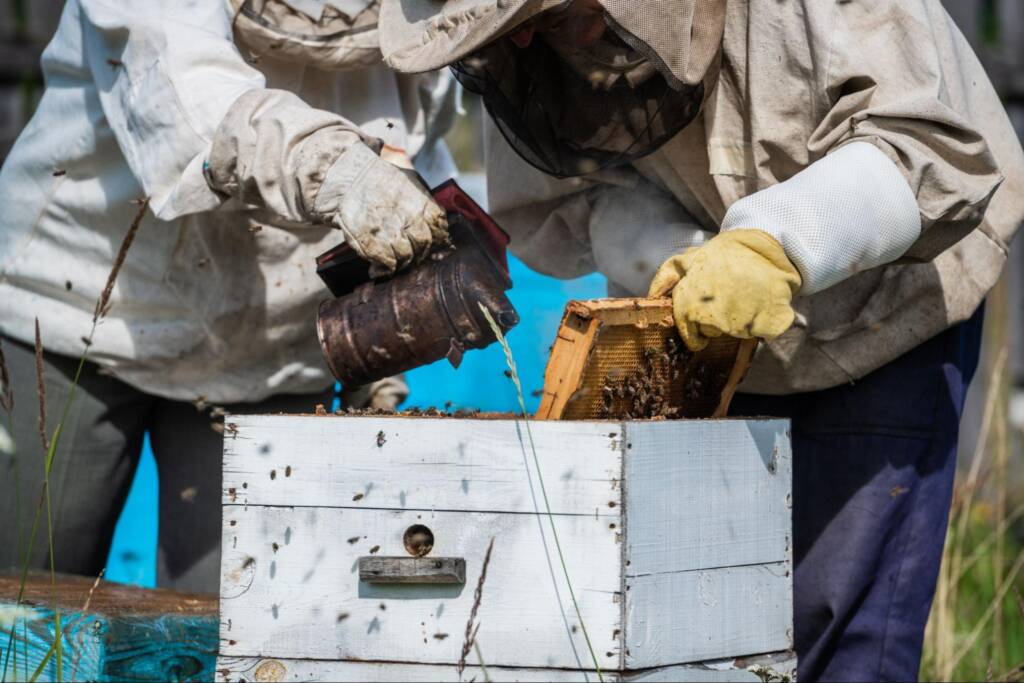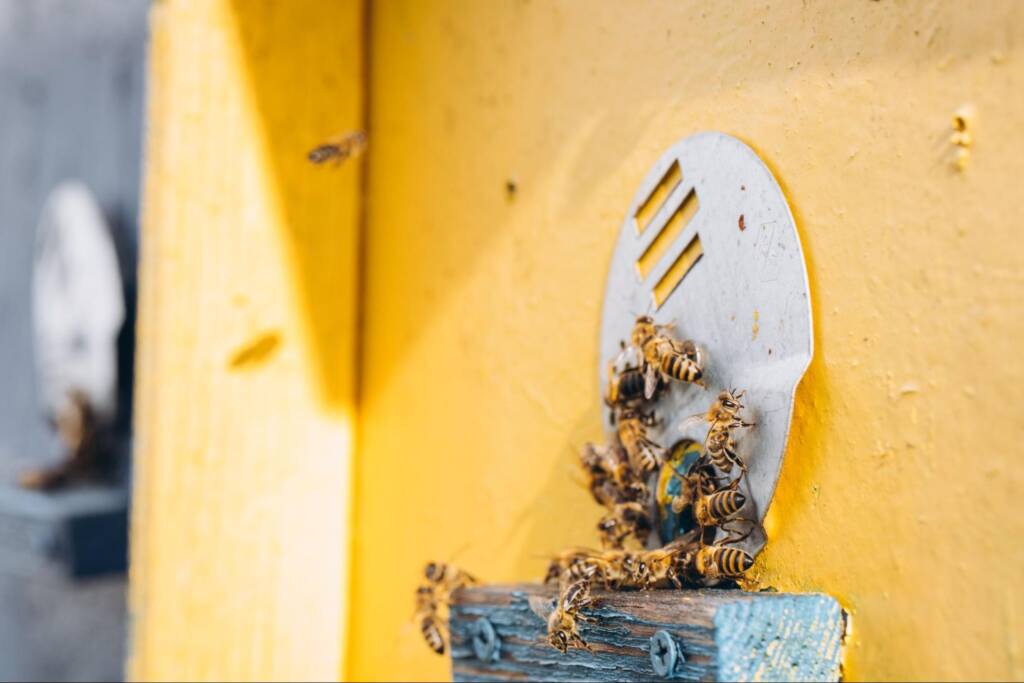Bees are essential to the ecosystem, playing a critical role in pollinating plants that support biodiversity and food production. Their work is vital for crops like fruits, vegetables, and nuts, contributing to agriculture and natural ecosystems. When bees establish a nest on residential or commercial properties, homeowners face the challenge of choosing the appropriate solution. Deciding between contacting a bee pest control specialist or a beekeeper depends on factors like the nature of the infestation, safety concerns, and environmental impact. Understanding their distinct roles helps homeowners make informed decisions that align with their needs and priorities.
Understanding the Role of a Bee Pest Control Specialist
Bee pest control specialists are trained professionals who manage bee infestations that present potential risks to human health and safety. These experts focus on handling situations where bees have become a hazard due to their proximity to people or animals. Their primary goal is to mitigate risks by removing or eliminating bee colonies using methods prioritizing safety and effectiveness. Here’s what a bee pest control specialist does:
Evaluates the Situation
The first responsibility of a bee pest control specialist is to assess the extent of the infestation and determine the best course of action. This includes evaluating the hive’s location, the bees’ behavior, and the potential risks to surrounding areas. Specialists inspect the environment to ensure they understand all factors before proceeding. The assessment helps decide whether immediate action is needed and which method will be most effective.
Removes the Bee Colony
Bee pest control specialists focus on safely removing the bee colony from the property. This often involves using pesticides or other techniques to eliminate the bees. The goal is to quickly reduce the population while minimizing harm to people or pets nearby. The specialists ensure that the colony is effectively removed and that there is no residual risk from the bees left behind.
Prevents Future Infestations
After the bees are removed, pest control specialists take steps to prevent future infestations. This can involve sealing entry points or areas where bees might be attracted to build a new hive. They may also recommend ongoing monitoring or installing deterrents to keep bees away. This role ensures that the infestation is fully dealt with and that steps are taken to avoid recurrence.
Educating Property Owners
An essential part of a bee pest control specialist’s role is educating property owners on minimizing the risk of future bee infestations. They advise on actions that can be taken around the property to make it less appealing to bees. This includes suggestions on landscaping, waste management, and spotting early signs of a bee colony. Educating homeowners helps them take preventive measures and manage their property better.
When to Call a Bee Pest Control Specialist
Bee pest control specialists are needed when bee infestations present immediate safety concerns or risk human health. These professionals handle situations where bees are too close to high-traffic areas, where their presence could lead to accidental stings or allergic reactions. If bees become aggressive or build their hives in hard-to-reach locations, pest control specialists are the best option for quick and effective removal. Below are the situations where calling a bee pest control specialist is necessary:
Bee Infestations in High-Traffic Areas
If bees are located near areas with frequent human activity, such as doorways, windows, or playgrounds, it’s crucial to call a bee pest control specialist. These locations pose a higher risk of accidental stings, which can lead to allergic reactions or other health concerns. The specialist will assess the threat level and decide on the appropriate action. Immediate removal is often necessary to avoid further risks.
Aggressive Bee Behavior
Bees that become aggressive can pose serious safety threats to people and pets nearby. They may swarm or attack if disturbed, increasing the likelihood of multiple stings. Pest control specialists are trained to handle these situations safely. They will remove or eliminate the hive, ensuring the area is secure and safe.
Inaccessible Hives
Bees can build hives in hard-to-reach places like walls, attics, or under roofing. These infestations are challenging for homeowners to handle on their own. A pest control specialist has the necessary equipment and expertise to remove the bees safely from these areas. They will also ensure that the infestation is fully addressed without causing damage to the structure.
Immediate Safety Concerns
When bees create immediate safety concerns, such as when a large swarm forms quickly or a colony is discovered unexpectedly, it’s essential to act fast. A pest control specialist can provide a quick solution to remove the bees and prevent further risks. Their expertise ensures that the bees are dealt with promptly without escalating the situation.

When to Call a Beekeeper
Beekeepers should be contacted when bees are found, especially if relocation is possible, and their presence does not pose an immediate safety threat. Their expertise in capturing and relocating bee colonies ensures that the bees are preserved and can continue their vital role in the ecosystem. Below are the situations when calling a beekeeper is the best option:
Non-Aggressive Bee Behavior
When bees are calm and do not exhibit aggressive behavior, beekeepers are the ideal choice for relocation. Non-aggressive and non-swarming bees can be safely captured and moved without harming humans or pets. Beekeepers will handle the colony gently, ensuring that the bees remain unharmed during the process. In these cases, relocation is the most environmentally friendly solution.
Bees in Easily Accessible Areas
Beekeepers can be called when bees are located in accessible areas, such as trees or garden structures, where the hive can be easily reached. These situations are perfect for relocation, as the beekeeper can remove the colony without much disruption. They will safely capture the bees and transport them to a new location where they can thrive. This helps maintain the health of the bee population without resorting to extermination.
Bee Colonies Near Gardens or Farms
Contacting a beekeeper is beneficial if bees are found near gardens or farms where they can support pollination. Beekeepers can relocate the colony to an area that promotes agriculture or encourages biodiversity. By ensuring the bees remain intact and continue their role in pollination, they can contribute to healthier crops and stronger ecosystems. This also benefits the beekeeper, as healthy colonies are essential for their work.
Environmental Considerations
Beekeepers are the preferred choice when the goal is to preserve bees and protect the environment. Unlike pest control specialists who may eliminate the bees, beekeepers focus on relocating them to new, suitable environments where they can continue their work. Calling a beekeeper in such cases supports biodiversity and helps protect valuable pollinator species, which is vital for the ecosystem.
Differences Between Bee Pest Control Specialists and Beekeepers
The roles of bee pest control specialists and beekeepers are distinct, each serving different purposes when handling bee infestations. Understanding these differences is essential for homeowners to make an informed decision when faced with a bee-related issue. The following are the key differences between these two professionals:
Approach to Bee Removal
Bee pest control specialists focus on eliminating or removing bees when there is an immediate threat to safety. Their methods often involve using pesticides or extermination techniques to quickly remove the colony. In contrast, beekeepers aim to preserve and relocate the bee colony to a safer location. Beekeepers use non-lethal methods to capture and relocate the bees, ensuring they can continue their pollination work elsewhere.
Impact on Bee Populations
Pest control specialists may contribute to declining bee populations, as their methods can result in the extermination of entire colonies. While this approach effectively removes the bees, it does not consider the long-term environmental impact. On the other hand, beekeepers are focused on protecting bee populations. By relocating colonies, they help maintain the bee population and support ecological balance, contributing to the preservation of pollinators crucial to biodiversity.
Cost and Accessibility
Bee pest control services can be more expensive, especially when the infestation requires immediate extermination or specialized removal techniques. These services are often available 24/7, making them the go-to option for urgent situations. Beekeepers may charge less for their services, as their primary goal is to relocate the bees rather than eliminate them. However, their availability may be more limited, and they are typically called for less urgent situations, such as non-aggressive bees or hives that can be safely moved.
Regulatory and Ethical Considerations
Bee pest control specialists are governed by pest control regulations, often needing to adhere to safety guidelines for pesticide use and bee removal practices. These regulations prioritize human safety over the protection of the bee colony. However, beekeepers often work under environmental or agricultural regulations emphasizing bee preservation. Beekeepers also tend to follow ethical practices that focus on minimizing harm to the bees and ensuring they are relocated safely, which helps support environmental sustainability.

Know When to Call Bee Pest Control or a Beekeeper
When deciding between a bee pest control worker and a beekeeper, it’s crucial to assess the situation based on the safety concerns, accessibility of the bees, and the goal of preserving or removing the colony. A pest control worker is ideal for handling aggressive or dangerous bees that pose immediate risks. At the same time, a beekeeper offers a solution focused on preserving and relocating the bees, which is beneficial for the environment. By understanding the differences in their approaches, homeowners can make a choice that aligns with their needs, ensuring safety and supporting ecological sustainability when possible.
Stay safe and learn more about effective bee pest control strategies on our Thrash Pest Control blog.

